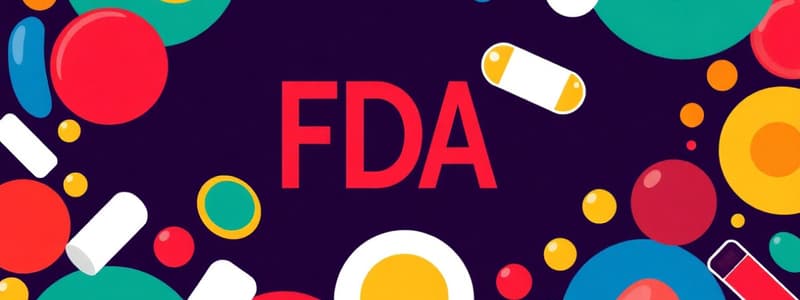Podcast
Questions and Answers
Which sources are known for the production of drugs?
Which sources are known for the production of drugs?
- Minerals, bacteria, and synthetic compounds
- Fungi, air, and natural gases
- Plants, animals, and synthesized in the lab (correct)
- Microorganisms, water, and chemicals
What type of drug is Tylenol with Codeine categorized as?
What type of drug is Tylenol with Codeine categorized as?
- Schedule III drug (correct)
- Non-scheduled drug
- Schedule II drug
- Schedule I drug
Who holds the legal authority to write prescriptions in a dental office?
Who holds the legal authority to write prescriptions in a dental office?
- Dentist (correct)
- Dental hygienist
- Registered nurse
- Pharmacist
What does the term 'inscription' refer to on a prescription?
What does the term 'inscription' refer to on a prescription?
What is the meaning of the abbreviation 'b.i.d.' in medical prescriptions?
What is the meaning of the abbreviation 'b.i.d.' in medical prescriptions?
Which route of drug administration is considered the slowest for absorption?
Which route of drug administration is considered the slowest for absorption?
What type of drug may be prescribed for a patient experiencing angina?
What type of drug may be prescribed for a patient experiencing angina?
Which of the following is considered an adverse drug effect?
Which of the following is considered an adverse drug effect?
What is Chlorhexidine primarily prescribed for?
What is Chlorhexidine primarily prescribed for?
Would diuretics be advisable for treating a cold?
Would diuretics be advisable for treating a cold?
Study Notes
Sources of Drugs
- Plants, animals, and laboratory synthesized substances are all sources for drugs.
Drug Names
- Motrin is a brand name for a drug.
Drug Schedules
- Tylenol with Codeine is a Schedule III drug.
Regulation
- The Food and Drug Administration (FDA) regulates the sale of medications and assesses their safety and effectiveness for daily use.
Prescriptions
- Dentists are legally authorized to write prescriptions in a dental practice.
- The inscription on a prescription specifies the name and quantity of the drug to be dispensed.
Prescription Abbreviations
- "b.i.d." stands for twice a day.
Drug Administration
- Sublingual drugs are administered under the tongue.
- Subcutaneous drugs are injected directly under the skin.
Drug Absorption
- The oral route is the slowest route of absorption for drugs.
Analgesics
- Analgesics are used for pain relief.
- They can be used for mild, moderate, or severe dental pain, post-surgical dental pain, or chronic facial pain due to temporomandibular joint inflammation.
Antibiotics
- Chlorhexidine is a type of antibiotic prescribed to manage plaque or gingivitis.
Cardiovascular Drugs
- Beta blockers, vasodilators, and calcium channel blockers are medications prescribed for patients with angina.
- Diuretics are not prescribed for the treatment of colds. They are cardiovascular medications used to reduce fluid retention and potentially decrease blood pressure.
Adverse Drug Reactions
- An adverse drug effect or allergic reaction is the term for the body's negative response to a drug.
Studying That Suits You
Use AI to generate personalized quizzes and flashcards to suit your learning preferences.



